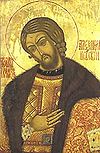- Nikolay Dukhonin
-
Nikolay Nikolayevich Dukhonin Born 1876 Died 1917 Allegiance  Russian Empire → Russian Republic
Russian Empire → Russian RepublicService/branch Russian Imperial Army Rank General Commands held Russian Imperial Army Battles/wars World War I Nikolay Nikolayevich Dukhonin (13 December 1876 – 3 December 1917[1]) was a Russian general, the last commander-in-chief of the Russian Imperial Army.
Biography
Dukhonoin was born in the Smolensk Governorate. He served in the Kiev Military District before the start of the First World War. There he gained some experience in intelligence work.
At the outset of the War, Dukhonin was given command command of a Russian regiment. He was then assigned to the Third Army in Dubno under General Ruzsky as senior adjutant of the intelligence department.
Dukhonin held the position of commander in chief only briefly, from 16 November 1917. During the initial stages of the Bolshevik seizure of power the Council of People's Commissars instructed Dukhonin to cease wartime hostilities and open negotiations with the German government.
Lenin and Krylenko visited Dukhonin in Petrograd to discuss an armistice proposal. Dukhonin's response was adamant: on 22 November he categorically declined to obey the directive of the Council of People's Commissars. He had discussed such a development with diplomats from the Entente governments. Dukhonin told Lenin that such an order could only be issued by "a government sustained by the army and the country".
Lenin immediately proceeded to a wireless station and broadcast news of Dukhonin's dismissal as Commander-in-Chief and Krylenko's replacement in his stead. The following day a joint note was issued by the military missions of Britain, France, Italy, Japan and Roumania, citing the Treaty of 23 August 1914 by which the allies agreed not to conclude an armistice except by common consent. These missions were based at the General Headquarters in Petrograd.[2]
Dukhonin consequently surrendered to Krylenko in Mogilev, but was murdered by Krylenko's bolshevik military escort by the railway station on 3 December 1917. Krylenko pleaded for his life to be spared so that Dukhonin would be allowed a trial by the Revolutionary Tribunal in Petrograd, but a mob of soldiers and sailors bayoneted him to death on the spot on order of Pavel Dybenko.[3] The next morning the bolshevik soldiers and sailors amused themselves by using his (now stripped naked) corpse for target practice, which they had placed on the platform with a cigarette in its mouth.[4]
His family emigrated to Yugoslavia.
References
- ^ Dates given in the Gregorian calendar
- ^ Soviet Foreign Policy Vol. 1 1917 - 1945, ed Andrei Gromyko and Boris Ponomarev, Progress Publishers, 1980
- ^ Andew Kalpaschnikoff, A prisoner of Trotsky's, 1920
- ^ Andrew Kalpschnikoff, A prisoner of Trotsky's, 1920
External links
People from Russia Leaders and religious - Pre-1168
- 1168–1917
- 1922–1991
- 1991–present
- RSFSR leaders
- General secretaries
- Soviet premiers (1st deputies)
- Soviet heads of state (and their spouses)
- Prime ministers (1st deputies)
- Foreign ministers
- Prosecutors general
- Metropolitans and patriarchs
- Saints

Military and explorers - Field marshals
- Soviet marshals
- Admirals
- Aviators
- Cosmonauts
Scientists and inventors - Aerospace engineers
- Astronomers and astrophysicists
- Biologists
- Chemists
- Earth scientists
- Electrical engineers
- IT developers
- Linguists and philologists
- Mathematicians
- Naval engineers
- Physicians and psychologists
- Physicists
- Weaponry makers
Artists and writers Sportspeople - Chess players
Categories:- 1876 births
- 1917 deaths
- Russian murder victims
- Russian military leaders
- People murdered in Russia
- Victims of Red Terror in Soviet Russia
- Imperial Russian Army generals
- Recipients of the Order of Saint Stanislaus (Russian)
- Recipients of the Order of Saint George III Class
- Recipients of the Order of Saint George IV Class
Wikimedia Foundation. 2010.
